Classic Commentaries and Studies on Proverbs (20 vols.)
Digital Logos Edition
Overview
Proverbial teaching is one of the most ancient forms of instruction—handed down in short, pithy, easy-to-remember sayings, proverbs have long been used to instruct and exhort. The Book of Proverbs, in keeping with the form, is designed for reflection and practical application. Amassing some of the most significant late-nineteenth- and early-twentieth-century studies on Proverbs, these volumes put the Old Testament book under the microscope.
Classic Commentaries and Studies on Proverbs offers more than 6,000 pages of interpretation, observation, translation, contextual history, reflection, and practical application. A rich and varied collection, it combines accessibility and scholastic richness.
The collection is essential for students, scholars, pastors, historians, teachers of the Bible, and anyone else studying the book of Proverbs. In the Logos edition, Classic Commentaries and Studies on Proverbs is completely searchable—Scripture passages appear on mouse-over and link to the Greek and Latin texts and English translations in your library. This makes these volumes more powerful and easier to access than ever before. With the advanced search features of Logos Bible Software, you can perform powerful searches by topic or Scripture reference—finding, for example, every mention of “wisdom” or “folly.”

- More than 6,000 pages of scholarship on the book of Proverbs
- Notable authors from a variety of backgrounds
- Completely searchable analysis linking to your favorite Bibles and the other books in your library
- Title: Classic Commentaries and Studies on Proverbs
- Volumes: 20
- Pages: 6,115
This title is included in the following collections
You can save when you purchase this product as part of a collection.
Logos 8 Collector's Edition Le...
$11,399.99$11,399.99Logos 9 Collector's Edition Le...
$11,399.99$11,399.99Logos 8 Ultimate Legacy Librar...
$21,749.99$21,749.99Logos 9 Ultimate Legacy Librar...
$24,999.99$24,999.99
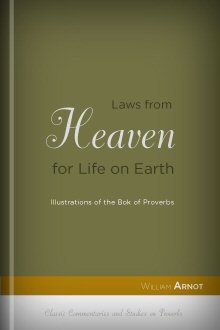
In this verse-by-verse exposition, William Arnot guides readers through Proverbs’ spectrum of topics, illustrating the spiritual and earthly implications of Solomon’s words. He offers commentary on the practical application of this kingly advice, encouraging readers to live a Christ-centered life in light of the Proverbs.
William Arnot (1808–1875) was a Scottish preacher and theological writer who studied and ministered in Glasgow.
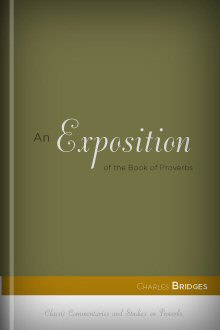
Charles Bridges’ An Exposition of the Book of Proverbs exhorts and encourages believers to walk in the way of wisdom by considering the weight of the Proverbs’ instructions. Taking a chapter-by-chapter, verse-by-verse approach, this exposition on the Book of Proverbs offers insight into and wisdom on the words of Solomon, inviting the reader to explore the spiritual ramifications of each of the wise king’s admonitions. Bridges stresses that the purpose of Proverbs is that it be read and regarded in light of its relevance to daily life, in order that we might become “men of sound godliness.”
Charles Bridges (1794–1869) was a well-known and prominent leader of the Evangelical Party in the Church of England. He is best remembered for his Old Testament commentaries and for The Christian Ministry, his 1829 treatise on pastoral ministry that remains influential today.
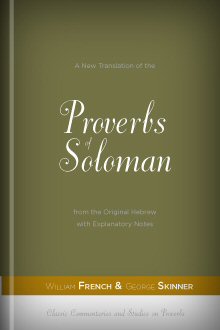
Offering a new translation based on a diligent examination of the original Hebrew biblical texts and their kindred dialectal versions, George Skinner and William French’s A New Translation of the Proverbs of Solomon from the Original Hebrew with Explanatory Notes seeks to shed new light on the meanings of the Proverbs. With copious translation notes and explanations, Skinner and French’s volume seeks to clarify the meanings of Hebrew words and idioms.
William French (1786–1849) was the master of Jesus College in Cambridge. His other works include A new Translation of the Book of Psalms from the original Hebrew.
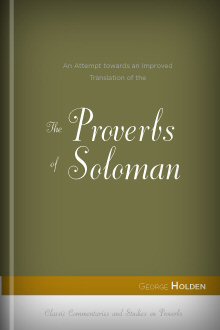
George Holden’s An Attempt towards an Improved Translation of the Proverbs of Solomon examines the nuances and subtleties of the Hebrew language in order to bring about a more exacting translation. Complete with critical and explanatory notes, Holden’ version seeks to make clear precise meanings from the text while staying as true to the original intentions of the author as possible.
George Holden (1783–1865) was a theological writer and accomplished Hebraist. He was educated at Glasgow University.
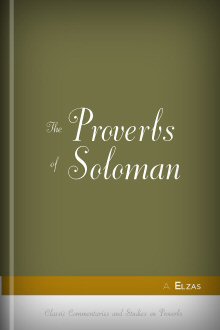
A. Elzas’s The Proverbs of Solomon offers a concise yet well-constructed translation of the book of Proverbs based on his consultations with the leading Jewish, Christian, English, and foreign commentators of his time, as well as on research on the Talmud itself.
A. Elzas (1835–1880) was a scholar, author, critic, editor, historian, and rabbi who translated several books of the Bible from the original Hebrew.
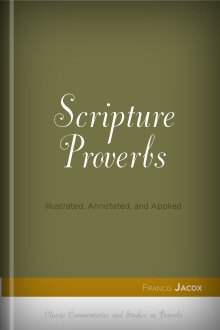
Broadening the scope of proverbs above the book itself, Francis Jacox examines proverbial statements from across the Scriptures in Scripture Proverbs: Illustrated, Annotated, and Applied, bringing to light some of the less-attended-to biblical maxims. Jacox expounds on these sayings, unraveling the cultural and historical significance of their words in context, providing illustrations and applications of the proverbs outside of Scripture.
Francis Jacox (1825–1897) was an English clergyman and author.
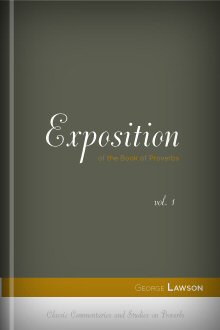
In Exposition of the Book of Proverbs, vol. 1 George Lawson explicates and expounds on the first 17 chapters of the book of Proverbs. He highlights the nuances of the text, providing in-depth illustrations and applications of Solomon’s instruction, connecting the wise king’s words with other parts of Scripture in an effort to fully explain the universality of the proverbs.
George Lawson (1749–1820) was the minister of the Scottish Succession Church for 49 years.
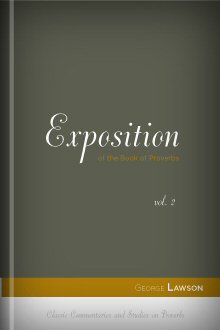
In Exposition of the Book of Proverbs, vol. 2 George Lawson explicates and expounds on the last 14 chapters of the book of Proverbs. He highlights the nuances of the text, providing in-depth illustrations and applications of Solomon’s instruction, connecting the wise king’s words with other parts of Scripture in an effort to fully explain the universality of the proverbs.
George Lawson (1749–1820) was the minister of the Scottish Succession church for 49 years.
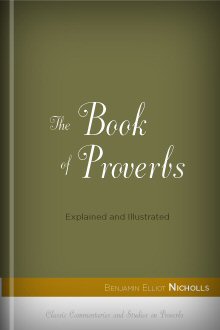
Providing scriptural examples of the proverbs in action, Benjamin Elliott Nicholls explicates the book of Proverbs. He provides an overview of its purpose and suggestions on how to interpret Solomon’s advice in the context of culture, history, and geography.
Benjamin Elliot Nicholls (1837–1915) was the Curate of St. John’s Chapel in Walthamstow; he wrote Help to the Reading of the Bible.
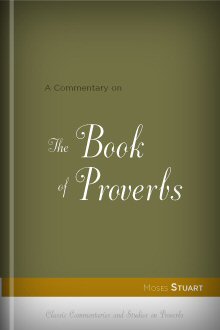
The book of Proverbs is a window into the manners and morals of the Hebrews, reflecting the feelings, ways of reasoning, social conditions, and internal relations of a nation. Dividing the book of Proverbs into four parts, Moses Stuart discusses the authorship, characteristics, and historical importance of the proverbs in light of ancient versions of the text such as the Peshito and Targum, among others. He provides commentaries and exegetical dissertations on the proverbs themselves.
Moses Stuart (1780–1852) was an American biblical scholar and the professor of sacred literature at Andover Theological Seminary. He authored several commentaries on books of the Bible.
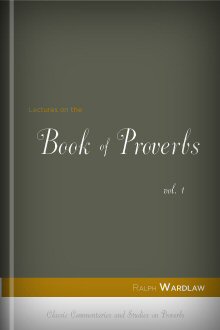
The first of a three-volume collection of edited sermons on the book of Proverbs by Ralph Wardlaw. Wardlaw’s sermons tackle nearly every proverb, mining the riches of Solomon’s brief words in in-depth lectures originally preached during Sunday-morning meetings. Volume 1 contains 34 lectures on Proverbs 1–13.
Ralph Wardlaw (1779–1853) was a Scottish Presbyterian clergyman and writer.
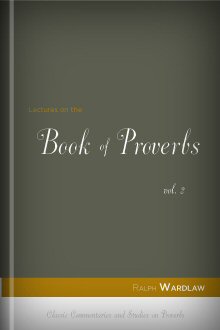
The second of a three-volume collection of edited sermons on the book of proverbs by Ralph Wardlaw. Wardlaw’s sermons tackle nearly every proverb, mining the riches of Solomon’s brief words in in-depth lectures originally preached during Sunday-morning meetings. Volume 2 contains 30 lectures on Proverbs 14–21.
Ralph Wardlaw (1779–1853) was a Scottish Presbyterian clergyman and writer.
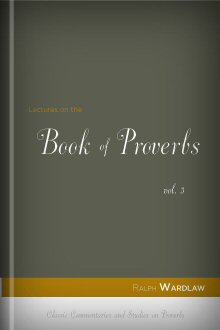
The third of a three-volume collection of edited sermons on the book of proverbs by Ralph Wardlaw. Wardlaw’s sermons tackle nearly every proverb, mining the riches of Solomon’s brief words in in-depth lectures originally preached during Sunday-morning meetings. Volume 3 contains 32 lectures on Proverbs 21–31.
Ralph Wardlaw (1779–1853) was a Scottish Presbyterian clergyman and writer.
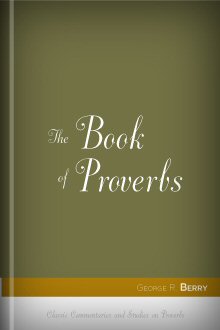
The Book of Proverbs is an in-depth, thoughtful commentary that examines the book as a whole, exploring such questions as authorship, purpose, and place in the scriptural canon. George R. Berry affords ample space to etymology and proverbial nuances, viewing the book through both literary and scriptural lenses.
George R. Berry (1865–1945) was the professor of Old Testament interpretation and Semitic languages at Colgate University.
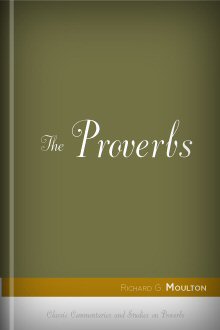
Stripping the book of Proverbs of its customary delineation by chapter and verse, Richard G. Moulton reclothes the words of wisdom in sonnets and monologues. Allowing the inherent parallelism to shine, Moulton explores the proverbs through rhetorical and metrical structure, allowing the stanzas to form organically rather than forcing them into arbitrary constructs, thus allowing these ancient words to take on new life and meaning.
Richard G. Moulton (1849–1924) was a professor, author & lawyer born in England.
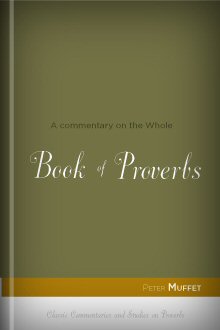
Peter Muffet’s Commentary on the Whole Book of Proverbs seeks to expose the heart of Solomon’s words through a careful exegesis of the text. Rather than taking the work line by line, Muffett illustrates the meanings of the proverbs in context, linking them to other Scriptures and provoking the reader to thought with further theological and philosophical questions.
Peter Muffet (d. 1617) also authored The Excellencie of the mysterie of Christ Jesus. He was the rector of Fobbing, Essex, from 1592 until his death.
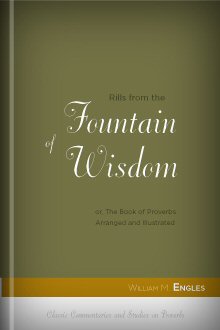
Rills from the Fountain of Wisdom provides reflections on the proverbs in an easy-to-approach devotional style. Abandoning a typical chapter and verse approach, William M. Engles meditates on the proverbs by focusing, instead, on the subject matter of each proverb. He invites the reader to ask questions and to delve into the depths of the word and unveil the beauty and wisdom within.
William M. Engles (1797–1867) was a Presbyterian minister in Philadelphia and the editor of The Presbyterian. He was awarded a doctorate by Pennsylvania College and appointed editor to the Presbyterian Board of Publication.
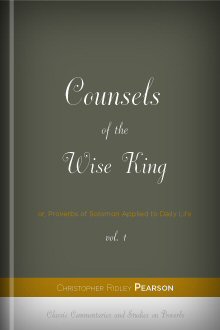
A devotional based on the Proverbs, Counsels of the Wise King provides passages, interpretation, illustrations, and applications for daily meditation and study. Intended for use in private devotion, each day’s reading encourages readers to look further into the proverbs for insight and revelation and to consider how the words can and should affect one’s life. Volume 1 contains devotions for January 1–June 30, with special meditations for holy days appended.
Christopher Ridley Pearson (1826–1905) attended Queen’s College in Cambridge and was the first vicar of St. James’s parish, Tunbridge Wells.
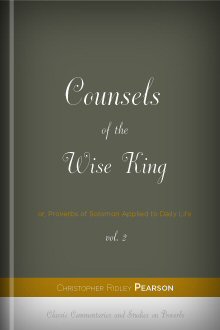
A devotional based on the Proverbs, Counsels of the Wise King provides passages, interpretation, illustrations, and applications for daily meditation and study. Intended for use in private devotion, each day’s reading encourages readers to look further into the proverbs for insight and revelation and to consider how the words can and should affect one’s life. Volume 2 contains devotions for July 1–December 31, with special meditations for holy days and indexes appended.
Christopher Ridley Pearson (1826–1905) attended Queen’s College in Cambridge and was the first vicar of St. James’s parish, Tunbridge Wells.

In Golden Words from the Book of Wisdom, F. A. Wightman seeks to restring Proverb’s pearls of insight according to a more systematic classification, joining the book of Proverbs with a portion of the book of Ecclesiastes. Hoping to spark a new appreciation of the words of Solomon through this more classified arrangement, Wightman provides a topical approach to this ancient book, gathering together proverbs of the same nature and context.
F. A. Wightman (1860–1939) was a Canadian minister and theologian.
Reviews
9 ratings

SEONGJAE YEO
10/5/2019

Jim McGarigle
11/21/2014
Should be called the BRITISH Classic Commentaries and Studies on Proverbs. Didn't see 1 Lutheran commentary on the list. It wouldn't be hard to add in at least the K&D.Dennis Pulley
4/17/2014
AeliusCicero
4/15/2014

David Leslie Bond
11/20/2013

Larry Proffitt (I
11/13/2013

RICHARD A. RAY
10/23/2013
Eduardo Vega
9/25/2013
Phil Niebergall
7/30/2013
Wendall Hollis
10/28/2012
The classics may be classic, but too old to be valuable to me. Instead, what I want is the great modern commentary by Michael Fox on Proverbs 1-9. You tease us by offering his 10-31 volume but then don't offer us the 1-9 volume, requiring us to buy the entire AB OT set to get this one volume. No number of classics can take the place of his acclaimed first volume on Proverbs.